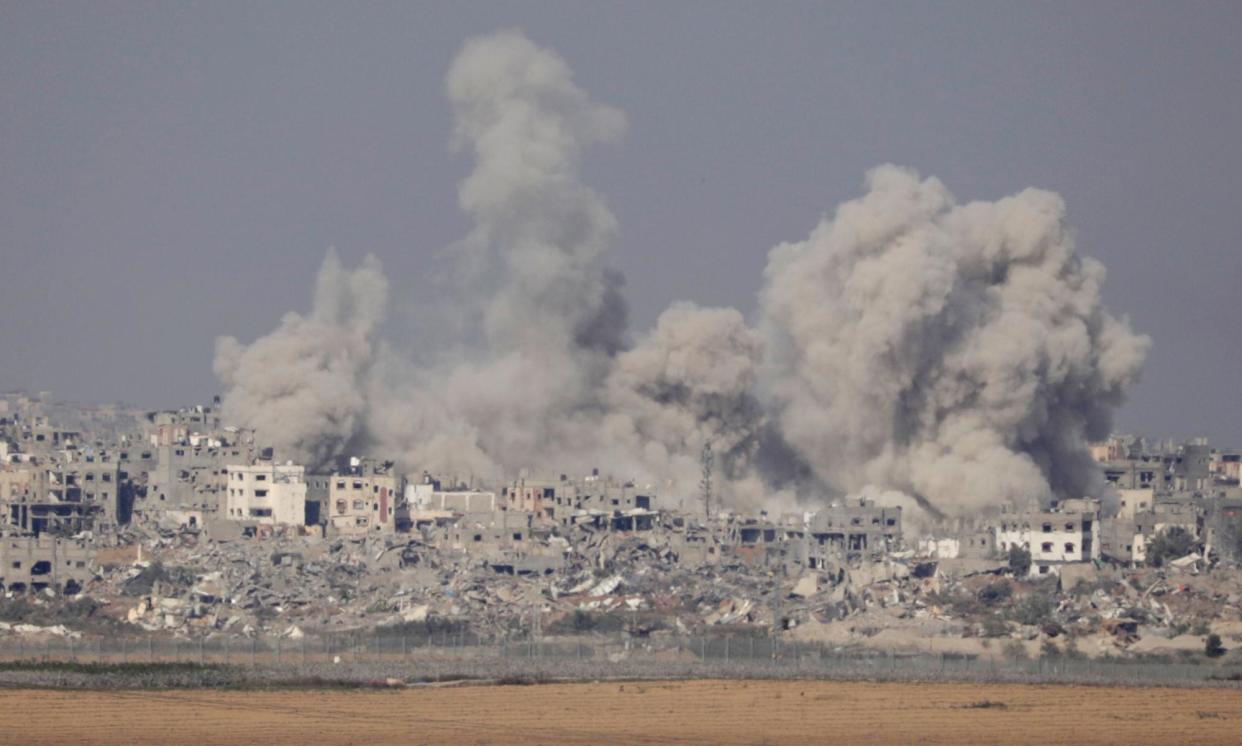Gaza society 'on brink of full-blown collapse', says UN official

Gaza society is “on the brink of full-blown collapse”, with looting of aid convoys and stoning of UN vehicles, a senior UN official has warned.
Thomas White, the head of UNWRA, the main UN agency in Gaza, tweeted on Friday: “Civil order is breaking down in Gaza – the streets feel wild, particularly after dark – some aid convoys are being looted and UN vehicles stoned. Society is on the brink of full-blown collapse.”
His comments came as Israel intensified its strikes on Gaza, hitting more than 450 targets across the territory from land, sea and air in the 24 hours up to Friday morning. It was the largest number of airstrikes in a 24-hour period since the temporary ceasefire ended a week ago.
The main north-south route through the Gaza Strip was “a battlefield”, an Israeli military spokesperson said.
Antony Blinken, the US secretary of state, suggested Israel was failing to deliver on promises to protect civilians in Gaza. “There does remain a gap between … the intent to protect civilians and the actual results that we’re seeing on the ground,” he told a press conference in Washington on Thursday.
His public statement was an indication of growing dismay and frustration among western diplomats over the scale of civilian deaths in Gaza in the two-month war between Israel and Hamas.
According to the health ministry in Hamas-run Gaza, more than 17,000 Palestinians have been killed since Hamas’s deadly assault on Israel on 7 October, in which 1,200 Israelis were murdered and 240 taken hostage. About 70% of the deaths in Gaza are women and children, the health ministry says.
UNRWA – the full name of which is United Nations Relief and Works Agency for Palestine Refugees in the Near East – said the crisis in Gaza was reaching a point of no return. Philippe Lazzarini, the agency’s commissioner-general, said: “States must find the political will to end this tragedy. Failing to act now and stop the carnage will forever stain our credibility as representatives of the international community, and fuel endless cycles of violence that will eventually engulf us all.”
As many as 1.9 million people – more than 85% of Gaza’s population – have been displaced, many of them multiple times, UNRWA said. More than a million people were sheltering in 94 UN facilities in the southern half of the strip.
Tens of thousands of people displaced by fighting have crowded into the town of Rafah, on the border with Egypt, and Muwasi, an area of barren coastline between Khan Younis and Rafah that Israel has declared a safe zone. Many people have pitched tents along the side of the road leading from Rafah to Muwasi.
On Thursday, Martin Griffiths, the UN’s humanitarian chief, said: “We do not have a humanitarian operation in southern Gaza that can be called by that name any more.”
The pace of Israel’s military assault “has made no place safe for civilians in southern Gaza, which had been a cornerstone of the humanitarian plan to protect civilians and thus to provide aid to them. But without places of safety, that plan is in tatters.”
Residents and the Israeli military both reported intensified fighting in both northern areas, where Israel had previously said its troops had largely completed their tasks last month, and in the south where a new assault was launched this week.
More strikes were reported on Friday morning in Khan Younis in the south, the Nuseirat camp in the centre and Gaza City in the north.
The Israeli military’s Arabic-language spokesperson posted to social media that troops were operating “forcefully against Hamas and terrorist organisations in the Gaza Strip, especially in the Khan Younis area and the northern Strip”.
He said all residents must leave the Jabaliya and Zeitoun areas in the north, as well as Shejaia and the old city in Gaza City. In the south, residents seeking shelter should head along the coast, with the main north-south route through Gaza now “a battlefield”, he said.
Related: US to oppose Arab-backed resolution calling for urgent Gaza ceasefire
The Nasser hospital, the main medical facility in Khan Younis, was overwhelmed with bodies and wounded people.
Meanwhile, the armed wing of Hamas said it had repelled an attempted hostage rescue by Israeli special forces, inflicting several military casualties. A captive also died in the incident, it reported.
In a statement on Telegram, Hamas’s al-Qassam Brigades said its fighters discovered a special forces unit mounting a rescue attempt and attacked it, killing and wounding several soldiers. It did specify the location of the incident.
It said a captive Israeli soldier was killed, naming him as Sa’ar Baruch, 25. Lists of the hostages published by Israel have named one as Sahar Baruch, a civilian student who was 24 when he was seized from his home on 7 October.
Asked about the Hamas statement, Eylon Levy, an Israeli government spokesperson, said: “We are not going to comment on psychological warfare that Hamas continues to wage against the people of Israel.”
Arab and predominantly Muslim nations have called for a vote on Friday on a UN security council resolution to demand an immediate ceasefire. The US, Israel’s closest ally, appears likely to block any effort to halt the fighting.


